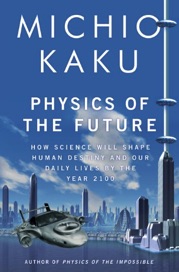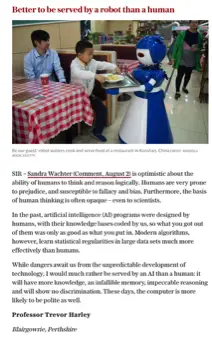The Science of Consciousness:
Chapter 4: Machine Consciousness
What this chapter is about: Could a computer or robot ever be conscious?
What do robots and computers tell us abour consciousness (if anything)? Do we have anything to fear from AI?
What is neuro-enhanement, how might we benefit from it, and what are the dangers?
There's relatively a lot of extra information on this page, partly because I find it interesting, but also a great deal of it is controversial, if not simply speculative.
Errata
p. 82. I knew there had to be mistakes somewhere, and I have found my first. I talk about Simon and Newell making five predictions and then only listing four, so that should have been they made four predictions. Also it should have been 1958, not 1968, and the reference is:
Simon, H.A. & Newell, A. (1958). Heuristic problem solving: The next advance in operations research. Operations Research, 6, 1-10.
The sense of what I wrote remains correct, though.
Ethics of AI
There has been much recent discussion about the ethics of AI, and the extent to which AI poses dangers to humanity.
Abong many links see for example,
Artificial intelligence could lead to extinction
For what it's worth, I think it's pointless (dangerous even) for western countries to stop research into AI unless everyone does - which isn't going to happen.
I have also long argued that education needs a fundamental rethink in the age of AI.
Note that an AI does not have to be conscious to pose a threat!
In the news
There are regular articles in the press about neural prostehtics and controlling the environment.
Google engineer says Lamda AI system may have its own feelings. Generally seens as going too far, but it shows that perhaps we are starting to get close. Again raises the point of whether it's acceptable to switch off a "thinking" programme.
'Exhilarating' implant turns thoughts to speech. The headline about this neural prosthetic is a bit misleading. It's proving to be - as anyone with knowledge of spcyhology would expect - challenging to turn thoughts into speech. The headline suggests that the person thinks of saying "What a nice day today" and an external speaker produces those sounds. What actually happens is that an implant picks up motor instructions in the brain to the articulatory apparatus (jaw, tongue, and larynx), and an external system then synthesises the sounds. As you can hear from the sample, it's currently far from perfect, but this type of technology usually improves quickly.
Paralysed man moves in mind-reading exoskeleton. Similar sort of story about motor cortex impants.
Brain interface lets paralysed man write as if by hand. For the source see:
Willett, F. R., Avansino, D. T., Hochberg, L. R., Henderson, J. M., & Shenoy, K. V. (2021). High-perormance brain-to-text communication via handwriting. Nature, 593(May). https://doi.org/10.1038/s41586-021-03506-2
Brain reading devices helping paralysed people to move in Nature 2022.
Transhumanism: How far would you go for a body upgrade? Reasonable insight and examples of current low-end physical body modification.
Lawyers with brain implants wil be better, faster and cheaper. There was a bit of a fuss in mid August 2022 about lawyers getting brain implants, making them better and cheaper, but able to bill by the minute, or "billable units of attention". I'm not sure why there was a particular fuss about this speculation: perhaps it's because August is the silly season for news. The same couod be said of anyknolwedge-based industry, somtime in the future, maybe. For a more sensational take on the same story see here.
AI creators must study consciousness. Of course they should. Buy my book!
Brain implants help paralysed man to walk again. A sign of the benfits of prosthetics and AI.
Elon Musk says Neuralink implanted wireless brain chip. Neuralink Co. implants a wireless chip in a human brain.
Transhumanism
I think transhumanism often gets a bad rap in the press, and indeed from scientists. Many argue that there are serious ethical considerations, but I am probably less worried than others - I do though admit the rules of the quiz programme University Challenge might need revision. Although Wikipedia calls it a philosophical movement, it is also a technology. The aim is to use emerging techologies to enhance and improve the human condition, for example by improving our intellect or prolonging our life span. Methods might include anything from neural prosthetics to something as simple as vitamins and supplements improve and extend our lives.
Augmenting the brain by implanting chips into it is a long way off, although the cognitive scientist Kevin Warwick has experimented with a chip implanted in his arm. Virtual reality glasses are a more immediate prospect; count me in for a pair of Apple Glasses when they become available. I can't imagine that contact lenses and then artificial corneas will be far behind. Imagine, permanently connected to the internet, with all information available with a slight movement of the eye. Checking your email as you fall asleep is probably not a good idea. Check out Michio Kaku's book Physics of the future for more details on how such lenses might work (see further reading below).
Much of transhumanism might currently seem to be in the realms of science fiction, but what's wrong with wanting to be a better person who lives longer?
See here for a link to Humanity+, the website of the World Transhumanist Assocation.
Futurology
This chapter taps into another of my interests, futorology, or future studies, as the subject is now sometimes called. How will the future of humanity pan out, and how will technological changes affect human life, work, and the environment? And how will these changes feed back to affect us and science? To take one specific example: what will happen when (when not if) robots replace most (if not all) workers, and AI replaces human decision making? No career is safe: would you prefer the mostly steady hand of a surgeon, or an always steady hand of a robot? Will you trust the mostly infalliable memory of a human lawyer, or the completely infalliable AI lawyer? And when these jobs have gone, how will humans earn a living? Will most of us live in poverty while a few super-super-rich cruise the world in luxury yachts? And what will happen when most people don't earn enough to be able to afford these products? Who will pay the taxes to keep any kind of welfare systemt going? Will the majority really want to carry on working if they don't have to because it's "part of our genetic haeritage, the Cave Man Principle" within us (Kaku, 2012)? And work at what? At least there will still be police to control the riots (exacerbated by the consequences of climate change) - until the cops are replaced by robocops. Many of the beliefs about the future seem far too optimistic to me. The future is bleak - or am I just pessimistic?
Further reading
Kaku, M. (2012). Physics of the future. London: Penguin Books. A physicist writes about how physics and technology might unfold over the next century. It is already interesting to read about predictions of the future in 2021 in a book written only ten years ago, and where they are off already. Fascinating and intriguing in parts, but slightly annoying in others. I am fed up with hearing about the clichés of "AI winters" (and I probably felt obliged to use it myself). Yes, people have been wildly optimistic about AI in the past, and will probably continue to do so, but one day it will deliver. At the time of writing this review (early 2021), people mostly overlook two things. First, the emphasis has shifted from programming to learning, and second, we are not limited by the capacities and abilities of human programmers because eventually computers will be programmed by computers. One example of self-programming is DeepCoder. The bottleneck need most definitely not be "the human". I also like the idea of being able to play computer games by power of mind alone, with implants or sensors, particularly the idea of playing opponents: my mind is more powerful than yours. I think it could have done with a good edit. Like many books these days, it assumes you live in the USA. I thought everyone knew that the Northeast meant Newcastle. And as for "Prince Charles of England" ... really. I also tired very quickly of being endlessly told "I had the opportunity of ..." and "I had the chance to vist ...". I think it happens with every topic. Yes, we're already jealous of your lifestyle, Michio. It's almost a tic. Surely a good editor should have cut back that sort of thing? Although the book is called "The Physics of the Future", it's mainly the medicine and technology of the future. Well worth reading, and probably the better the less you know.
Ishiguro, Kazuo. (2021). Klara and the sun. Faber & Faber. A novel set in the near future where some children have robot "Artificial Friends" (AFs). The novel is told from the point of view of the AF, Klara. AFs are solar-powered. The book had rave reviews, saying that the book explores "what it means to be human". I am a great fan of Ishiguro's books, and think he is a worthy Nobel winner, but I must admit Klara and the sun left me rather cold. Given how much others like it there is clearly something wrong with me. Perhaps I am a robot and don't realise it. I didn't enjoy it as much as the McEwan (see below), and not sure it told me anything about what it's like to be human, or about consciousness. But don't listen to me: try it yourself.
McEwan, Ian. (2019). Machines like me. Cape. A novel set in an alternative early 80s Britain where Alan Turing lives on and human-like robots are available for purchase, quickly coming to bring consciousness and emotion-related problems to the fore. I enjoyed it, although in general I'm a great Ian McEwan fan, while some of my colleagues find his views of human nature a bit bleak. It does raise many of the issues discussed in Chapter 4 in a fiction context. It will be rinteresting to read Ishiguro's "Klara and the sun" and see how they compare (see above).
Links
See BrainGate for work on brain implants, which allow people with devastating brain trauma and disease to move and communicate by thought. See the publications page for the range of advances made. It was previously owned by Cyberkinetics and founded by John Donoghue and others.
Further papers
Ng, Y.-K. (2021). Could artificial intelligence have consciousness? Some perspectives from neurology and parapsychology. AI & Society. https://doi.org/10.1007/s00146-021-01305-x.
Additional review questions
1. Would a conscious robot need to sleep?
2. Whenever my smart device does something wrong (which is often) I swear at her like a trooper. At what point should I start to worry that my behaviour is unacceptable?
3. In brain simulation research. exactly what is being simulated?
4. What ethical issues are involved with neuro-enhancement? What might be the consequences if neural enhancement is only available to a rich elite?




